- Home
- Lynne Truss
A Shot in the Dark Page 6
A Shot in the Dark Read online
Page 6
He lowered his voice and stood more to attention. ‘Please don’t move me on for being too clever, sir. It’s not my fault. I’ve already been transferred six times in my first three months.’
This emotional appeal, coming out of the blue, was very affecting. Brunswick looked heartbroken for him. ‘Six times?’ he repeated. ‘That’s awful, son.’
‘I know,’ sniffed Twitten.
‘Keep out of this, would you, Brunswick?’ said Steine. ‘Look, Constable. For one thing, I didn’t say you were too clever. I said you were annoying.’
‘I’m afraid other people have used the words “too clever”, sir. The words “too clever” are all over my personal file. Even Deputy Chief Inspector Peplow at Scotland Yard said I was too clever! That’s probably why you didn’t get any notification of my arrival. Until last Friday, I was working there. I had cracked the case of the Kennington Butcher, sir, which had frustrated him and his division for several years. They had unaccountably overlooked a human tooth embedded in a floorboard in the prime suspect’s scullery! When I pointed this out, my transfer was ordered almost immediately.’
This startling news put a new complexion on things for Steine. DCI Peplow was someone he loathed with a passion. Peplow had a suspiciously high clear-up rate that had three times secured for him the title ‘Policeman of the Year’, twice pipping the more high-profile Steine to the title. Twitten’s news changed things considerably. ‘The great Peplow couldn’t cope with you, you say? Because you were too clever?’
‘That’s right, sir.’
‘The famous Deputy Chief Inspector gave up on you? He washed his hands? He threw in the towel?’
‘He said I brought him out in hives, sir.’
‘Hives, you say?’
‘It’s a sort of aggravated rash, sir.’
‘I know what hives are, good grief.’ Steine shook his head. It was very hard to be patient with this boy. But he wouldn’t mind outdoing the great Peplow for once. He imagined shaking hands with Peplow at some all-male Top Ranks gathering (possibly in a smart bar at the Festival Hall, for some reason) and saying, smugly, ‘You found him too hot to handle, I believe? What an error! Young Twitten is a positive asset if you know how to manage him.’
‘Look, just leave this with me, Constable,’ he said.
Twitten looked relieved. ‘Thank you, sir. You’re my last hope, sir.’
‘But I’d rather you didn’t go to the Hippodrome tonight.’
Steine had made a decision that he considered would kill two birds with one stone: it would slow Twitten down a bit, and also remove the loathsome and vile-smelling Crystal from his own life.
‘I want you to take this ticket for a play called something like A Bob in the Slot at the Theatre Royal. And I want you to stay there, and not do any detecting, and watch the whole thing. Give those little grey brain cells of yours a rest.’
If this was meant to ruin Twitten’s day or put a spoke in his wheel, it failed. An excited grin appeared on his face.
‘You don’t mean A Shilling in the Meter? Oh my goodness. Thank you very much, sir.’
‘You’ve heard of it?’
‘Who hasn’t, sir?’
Steine sighed. ‘Well, don’t get too excited. You’ll be sitting next to A. S. Crystal of the Daily Clarion. Your biggest challenge will be not to murder him. Meanwhile Sergeant Brunswick can make enquiries at the Hippodrome about red-haired women with hammer-fingers, and with you two Sherlock Holmeses safely out of my hair, I can finally – finally – write my talk for the wireless on the rather thorny subject of the law on joint enterprise when applied to marauding mobs.’
Twitten had a bright idea. ‘If you ever need help with subjects for your talks, sir –’ he began, but Brunswick hustled him out of the room before he could say anything more.
‘Well done on the Kennington Butcher, son,’ Brunswick was saying, as they shut the door behind them, and Steine could hear Twitten reply, ‘There was a rug over it, sir. Can you believe that no one at Scotland Yard had ever thought to look underneath the rug?’
* * *
In advance of the first performance of A Shilling in the Meter, the cast were on edge. The technical rehearsal went well enough, though: the water dripped perfectly as directed into the tin bath (plip! – long pause – plop!); the expressionistic lighting effect for the arrival of the Man from the Gas Board at the end of Act Two looked excellent. For this grand moment, the door needed to swing open (and not swing back again), and a strong backlight cast a lengthy shadow of Alec across the raked floor of the stage, pointing to the exact spot where the hapless Ruby (Penny) lay dead. ‘I’ve come to read the meter,’ was the sonorous curtain line, as Alec shuffled in.
Braithwaite was very proud of this moment. It made him shiver. He insisted that Alec’s leather shoulder bag be filled, authentically, with heavy coin, even though the spindly Alec had nearly buckled under its weight several times in rehearsals. From the auditorium the heavy bag had clear significance: this bent old man collecting the dues was Death. And it helped the effect considerably (so Braithwaite always said to the others) that Alec looked a lot like death already.
* * *
On the shingly beach, by the bandstand, with the small murky waves dragging loose pebbles down the shore, and herring gulls dive-bombing grubby cockney tots unwisely holding unprotected ice cream cones, a diminutive, aggressive-looking Punch & Judy man was setting up his booth, muttering to himself in a Greek accent.
‘This ruddy pole go ruddy here?’ he was saying, as if he’d like to garrotte the person who designed this thing. ‘But that ruddy pole go ruddy there?’ He picked up a rock to start knocking the posts into the shingle, but was interrupted by the telltale crunch of footsteps on the shining stones.
‘Help you with the tent, Vince?’ offered Sergeant Brunswick, approaching. The sergeant walked taller than usual this afternoon, Vince thought. Vince was one of those people who don’t miss a thing.
Tent? Tent? Vince, in his old brown waistcoat worn over a slightly ragged collarless shirt – still holding the rock – gave Brunswick a withering, murderous look and spat on the ground. ‘Assa booth, mate,’ he said. ‘Not a ruddy tent!’
‘Sorry, I forgot. Help with the booth, then?’
‘Not on your ruddy life, Sergeant ratface ruddy Brunswick policeman rozzer ponce.’
It had often been noted that Ventriloquist Vince was not possessed of ideal qualities for the world of innocent seaside entertainment. Along with anger issues, it was possible he suffered from undiagnosed Tourette’s. If children gaily heckled the Punch & Judy (and they soon learned not to do this), Vince would step out from the booth, a puppet on each hand, and shout in their faces to shut the fucky-fuck up.
The police received complaints about Vince every single day of the summer, but he evidently had friends in high places. His public entertainment licence was often reviewed, and occasionally suspended, but inexplicably it had never been revoked.
He had been nicknamed ‘Ventriloquist Vince’ in the dim and distant past by underworld associates, and to be honest it had never made sense. Vince used no ventriloquism in his act; he didn’t even do much to inhabit the various characters in his show. Mr Punch, Judy, the baby, the hangman, the policeman – they all sounded the same in Vince’s rendition of the traditional story, apart from the heart-stopping screams for mercy, which he had definitely made his own.
‘Take that, you ratbag Judy bitch-face – Help! Help! You beating me a death, you ruddy psycho – I hit you on a head, you slag, I hit you smack, smack, smack on the head – Help, help! You want me to ruddy die? You go prison, mate, you hang by ruddy neck – What I fucking care, you brass, take that, smack, smack – I dying! Punch, you killing me! Stop! You killing your Judy! Stop! Stop! STOP!’
And so on, and so on, for as long as he could reasonably string it out. Sometimes he would emerge from the booth and find people holding their heads back with trauma-induced nosebleeds; sometimes he found that his audien
ce had scattered in horror. It didn’t bother him. Punch & Judy was a great British seaside tradition, and it had never had a more dedicated or passionate practitioner than Vince.
Brunswick had not come here about the Punch & Judy, though.
‘Maisie about?’ he asked, laconically.
‘What for you want my Maisie?’
‘Got tickets to the Hippodrome later. Thought she might like to come. And she’s not your Maisie, is she, now, Vince? There’s no call to say she’s yours.’
‘You lay one ruddy ratbag finger on that girl –’
‘Yeah, yeah,’ said Brunswick. ‘You’ll beat my ruddy ponce policeman ratface head in?’
Brunswick was, in fact, terrified of Ventriloquist Vince, but he did a very good job of disguising it.
At that moment a girl appeared from the beach-ball stall in the arches behind the bandstand. She was sucking on a gob-stopper in a somewhat provocative manner. This was Maisie. She was nineteen years old, well developed, bottle-blonde, with buck teeth, a pink hairband, blue dress and white bobby socks worn with red kitten heels. In short, in common with most teenagers of this period, she transmitted a blizzard of teasing mixed signals, and both Vince and Brunswick would gladly admit she drove them wild with confusion and desire.
And she was more than happy about that. She also enjoyed the way that every time she uttered the name of another man (‘Jim’, for example), it made Ventriloquist Vince twitch with barely controlled homicidal jealousy. It pleased her to have such power over him. The place where she sold beach balls, buckets and spades, and little windmills on sticks, was just yards from the Punch & Judy, but for some reason hearing Vince once an hour shrieking, ‘Stop! Don’t kill me! I never do sex with that policeman bastard ratbag! I woulda do that, Punch! I good girl, Punch, I good girl!’ didn’t alert her to the obvious peril of flirting with him day after day, while reserving the right to say ‘Jim’ to other men.
‘What colour’s my tongue, Jim?’ Maisie asked Brunswick now, with hand on hip. She poked it out. It was disgusting.
‘Mauve,’ said Brunswick. They were not alone. Vince stood just inches behind. He was still holding the rock.
‘Mauve? You sure?’ She poked it out again.
‘Pretty sure. Look… fancy going to the Hippodrome with me tonight?’
‘Don’t you go with ’im, Maisie!’ said Vince, in a threatening manner.
She made a screwed-up face at him, teasingly, as if to say, ‘You can’t stop me.’
‘What time, Jim?’ she said to Brunswick. Her buck teeth dazzled in the afternoon sun. Brunswick swallowed. He didn’t dare look down at those seductive ankle-socks.
‘I could pick you up at seven.’
‘All right, then, Jim.’
‘My treat.’
‘I should think so. I like port with Tizer. Remember? Vintage port if they got it.’
‘How could I forget?’ said Brunswick, smiling. As he walked away he noticed Vince take his heavy rock to the tent pole and, using both hands, pound it violently into the stones.
* * *
At Luigi’s on the seafront, a busy afternoon was not helped by the unexplained absence from work of Geordie Harry from Nova Scotia. Luigi felt sad and exploited. You train up a friendless drifter to make Knickerbocker Glories and then he just quits? Making Knickerbocker Glories was a good job! Squirting the raspberry sauce was an art in itself! But Harry had seemed unsettled ever since he’d seen the file on the table in front of Inspector Steine. Whatever was in that file had given Geordie Harry a nasty turn.
Employing him had been a charitable act of Luigi’s, because the man was so emotionally damaged that he was virtually a basket case. What with his tics and trances, it was as if he’d just returned from the trenches of the First World War. When pressed to explain his unusual nervous condition, all he would say was that he had been ‘a miner and a playwright’, and that it was being a playwright that had done for him.
This had made no sense to Luigi. Surely writing plays was the softest of soft jobs, while being a miner was the hardest of the hard. But Harry had stuck to his guns. The threat of imminent pit collapse, shared with your mates, was as nothing compared with the lonely anxiety of dramatic composition; and at least when you emerged from the pithead cage at the end of the day, blackened and exhausted, you got the rewards of light and air, ale and birdsong; you weren’t immediately beaten to the ground in a ritual of public humiliation.
It was nearly closing time when Luigi noticed a small sealed envelope in the till with the words ‘To Luigi, I’m sorry’ written on the outside. Reading its contents, he called in panic to his sons Alfredo and Giuseppe. They hastily shut the doors, dropped the blinds and searched the building, and soon found Geordie Harry’s stiff, icy, lifeless body on the floor of the big freezer. He had taken an overdose. In the note he thanked Luigi for giving him this last chance. He explained that Crystal was the man who had destroyed his life. ‘They say a bad review never killed anyone,’ he wrote. ‘Allow me to disagree.’
* * *
While Twitten waited at the Theatre Royal for Mr Crystal to turn up on that summery evening, he reflected on his first day with the Brighton Constabulary.
Most first days of this kind were presumably less busy or momentous – you found your way to the canteen, obtained a locker key, had an introductory chat with your divisional chief, and went home early to the station house – which was where Twitten would be boarding for the time being, a couple of streets away from the police station, until he could afford independent lodgings. First days probably didn’t usually include being ordered to gather your things and leave, on account of half-solving a case that would otherwise have languished unexamined.
On the other hand, they also didn’t usually include receiving a ticket to one of the most talked-about play openings of the decade, or meeting one of the most influential broadsheet newspaper critics. So it sort of evened out, he thought. Threatened with the sack; treated to a glittering landmark theatrical experience. If Twitten still didn’t know where the police station canteen was, and hadn’t got a locker, he didn’t feel too hard done by.
Twitten knew who to look out for in the pre-theatre throng; he had a good mental picture of A. S. Crystal. He also knew Crystal’s reputation. There were stories of glamorous leading ladies in their most stylish Parisian slingbacks kicking Crystal in the kidneys in Soho doorways. Flora Robson always denied it, but during a nasty fracas in Long Acre in 1954 after a royal command performance, she did bite a lump out of Crystal’s right ear. The writer of this play tonight, the attractively spiky Jack Braithwaite, had said on the wireless that critics like Crystal ought to be physically exterminated!
Looking at the people now gathering for this famously gritty and modern play, Twitten had to admit that his sympathies were more with Braithwaite: something was very out of kilter here, sociologically speaking. The foyer was sweatily packed with people dressed up for the evening in smart suits and satin gowns and evening gloves, as if they were going to a reception at Buckingham Palace. The women’s hair was set, stiff and lacquered; the air was dense with L’Air du Temps. It was hard to marry the promised slice-of-life drama with the type of people who were gathered to see it – all self-importantly crushed together, shouting to make themselves heard, while clutching shiny theatre programmes along with their expensive drinks and dainty boxes of soft-centred chocolates.
When Crystal arrived, Twitten introduced himself and apologised on behalf of Inspector Steine. He then suffered a short, inexplicable asthma attack, but waved away all offers of help, and soon recovered his breath to carry on. As for the oblivious Crystal, he was initially outraged at Steine’s rudeness in sending a deputy, but quickly placated. The young constable was polite and knowledgeable, and seemed very keen to learn about the theatre from an expert. But what pleased Crystal most – as they pushed their way past the fragranced buffoons who had, unaccountably, paid money to witness the upcoming abomination – was Twitten’s genuine inte
rest in the Aldersgate Stick-up. The young constable had spotted the file on the inspector’s desk, and put two and two together. It was an unsolved crime, he explained, that had fascinated him when he first studied it as a schoolboy, and he would love to hear anything that Crystal, as a highly reliable eyewitness, could add to his understanding.
Which was why, before the play started, Twitten and Crystal spoke only about a long-ago armed bank robbery in the City of London, and not about the theatre. As the seats filled up around them – and a woman in a seat behind asked Twitten (not unreasonably) to remove his helmet – Crystal took a piece of paper from his coat pocket, and produced a small fountain pen. On the paper, in tiny handwriting, was evidently a short list of points he had hoped to raise during his meeting with Steine; well, it was too late now. Having scanned it, though, he adopted a thoughtful expression and unscrewed the top of the pen, as if intending to add a new item.
‘May I ask what that is, sir?’ asked Twitten, standing up to let a fellow playgoer shimmy past. It didn’t help the flow of their conversation that Crystal’s seat was on the end of a row – position of choice of all newspaper critics from time immemorial, so that they can dash for the exits at the end of the play, under cover of the applause.
‘Well, Constable, since you ask, a few new angles on the Aldersgate Stick-up have occurred to me recently, since I’ve been working on my autobiography, A Shot in the Dark. My secretary Miss Sibert teased out some details and I was very grateful to her. You see, although I gave a splendidly thorough witness statement at the time, it should be remembered that I was suffering from shock; unsurprisingly, there were further memories that needed to be unlocked.
‘Fortunately Miss Sibert is a remarkable woman, who came to London from Vienna with Sigmund Freud back in 1938. She has helped me to remember all manner of things about my mother that are frankly staggering. Have you ever realised, for example, that for a mother to serve oxtail soup to her grown-up son is tantamount to castration? But I digress. I made these notes for Steine, but he was so pig-headed that he wouldn’t look at them.’

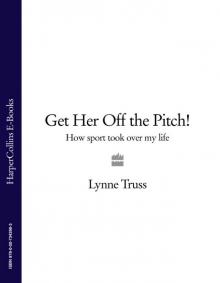 Get Her Off the Pitch! How Sport Took Over My Life
Get Her Off the Pitch! How Sport Took Over My Life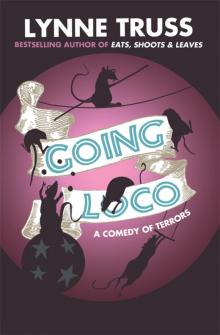 Going Loco
Going Loco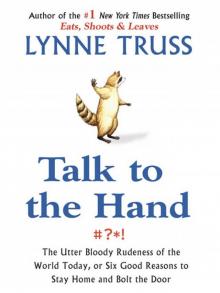 Talk to the Hand
Talk to the Hand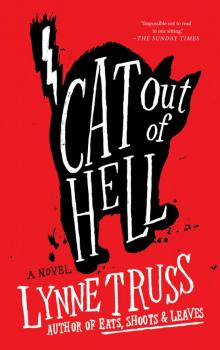 Cat Out of Hell
Cat Out of Hell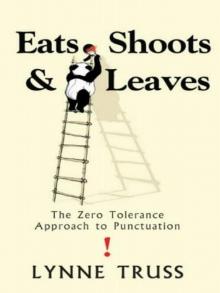 Eats, Shoots and Leaves
Eats, Shoots and Leaves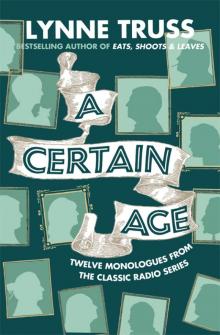 A Certain Age: Twelve Monologues From the Classic Radio Series
A Certain Age: Twelve Monologues From the Classic Radio Series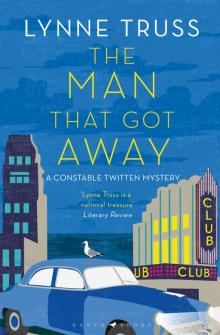 The Man That Got Away
The Man That Got Away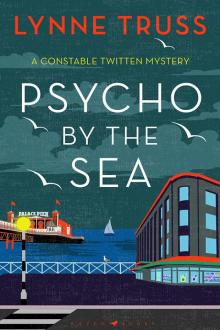 Psycho by the Sea
Psycho by the Sea With One Lousy Free Packet of Seed
With One Lousy Free Packet of Seed Tennyson's Gift: Stories From the Lynne Truss Omnibus, Book 2
Tennyson's Gift: Stories From the Lynne Truss Omnibus, Book 2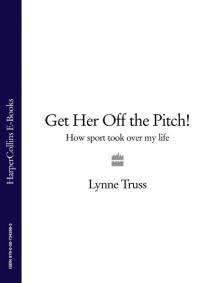 Get Her Off the Pitch!
Get Her Off the Pitch! Tennyson's Gift
Tennyson's Gift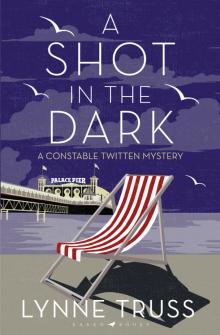 A Shot in the Dark
A Shot in the Dark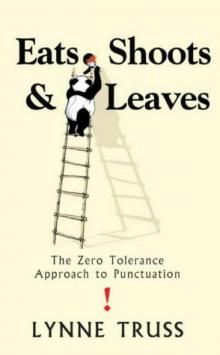 Eats, Shoots and Leaves: The Zero Tolerance Approach to Punctuation
Eats, Shoots and Leaves: The Zero Tolerance Approach to Punctuation